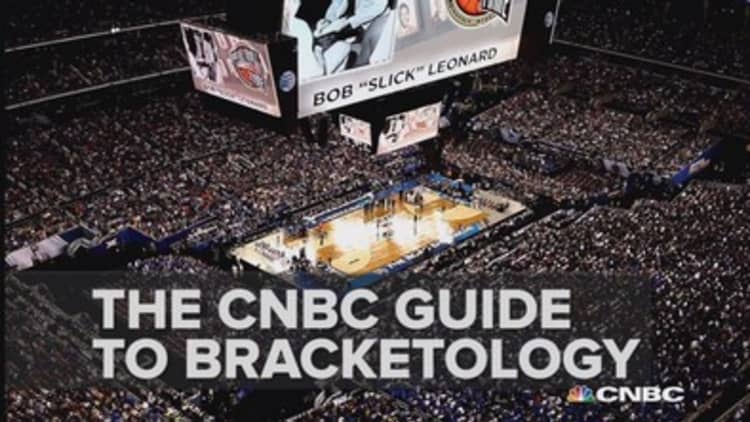March Madness has arrived. In coming days, office workers across the country will spend countless hours watching helplessly as their Final Four picks sweat it out in the early rounds against Cinderellas like Coastal Carolina and North Dakota State.
Employers will get clobbered because of the productivity drain, particularly on the first Thursday and Friday of the tournament (March 19-20) when multiple games at a time extend throughout the workday. Last year, Challenger, Gray & Christmas estimated employers would lose $1.2 billion for every unproductive work hour in the tournament's first week.
But many sales organizations have gotten smart, taking advantage of the competitive spirit to create their own tournaments that reward top performers with luxury vacations, gadgets and cash.
Read MoreThe `other' March madness
Only there's a problem. With a March Madness-style bracket, the field rapidly narrows, leaving most participants disinterested. If you're eliminated early on—same as if your tournament championship pick is toast after the second round—what's the fun?

"You don't want to have people check out after a week," said Chad Schott, vice president of training and development at HomeAdvisor, an online service that helps homeowners find local electricians, landscapers and roofers. For the company's 750 sales employees, the key is to "get more and more people to think they have a chance to win and maintain the activity level over a longer time," he said.
To accomplish that, HomeAdvisor is turning to Web-based software from a start-up called FantasySalesTeam, whose gaming technology is designed to improve the performance of sales contests.
Read MoreNCAA pool is worth $15,000—if you can write code
Modeled on fantasy sports, FantasySalesTeam lets salespeople draft their own teams of people within the office and compete individually as well as in groups. And it's not just about closing deals, because that's where top performers so often separate themselves from the pack and leave others disparaged and disengaged.
Rather, players can score incremental points for making phone calls, setting up meetings and passing leads to colleagues.
Competitions can be built around any number of sports, but March Madness is particularly popular because of its place in office culture and the intense two-plus week competition that leads to the Final Four.
Companies get to customize the games by defining the parameters. For March Madness, that means letting customers turn every salesperson into a point guard, forward or center and having employees build their starting five.
"Getting top performers on teams with lower performers is one of the best ways to keep people motivated longer, because they feel responsible to each other," said Adam Hollander, founder and chief executive officer of Austin, Texas-based FantasySalesTeam. "In this type of model, everyone starts paying attention to everyone else's performance around them."
Hollander was by no means the first to discover a problem with the traditional bracket model, but he may be the most ambitious in trying to create a fix. Developing a game that could handle all the nuances of a fantasy season requires specialized software that plugs into a company's customer relationship management system.
So in 2013, Hollander, a longtime salesman, formed FantasySalesTeam, and over the past year has raised $1.5 million to finance the start-up's early development. The company now has 100 paying customers and is almost doubling every quarter, Hollander said.
Read MoreBox CEO: Once in a lifetime transition to cloud
At Wireless Zone, an independent Verizon retailer, one of the franchise owners used the product late last year for his 35 employees and saw a 176 percent increase in month-over-month sales, according to a case study on the FantasySalesTeam website.
HomeAdvisor, in Golden, Colorado, has a couple weeks to determine the effectiveness of the March Madness competition and whether sales reps are as enthusiastic about it as they are watching the NCAA tournament from TVs in the break room or playing live three-on-three games on the outside basketball court.
Ultimately, Schott expects the new software to yield more sales of HomeAdvisor membership packages, ranging from about $24 to $90 a month, to help businesses connect with homeowners. If the game works, he's got another trick up his sleeve.
"This is March—well what happens in April?" Schott said. "In April you start baseball."


